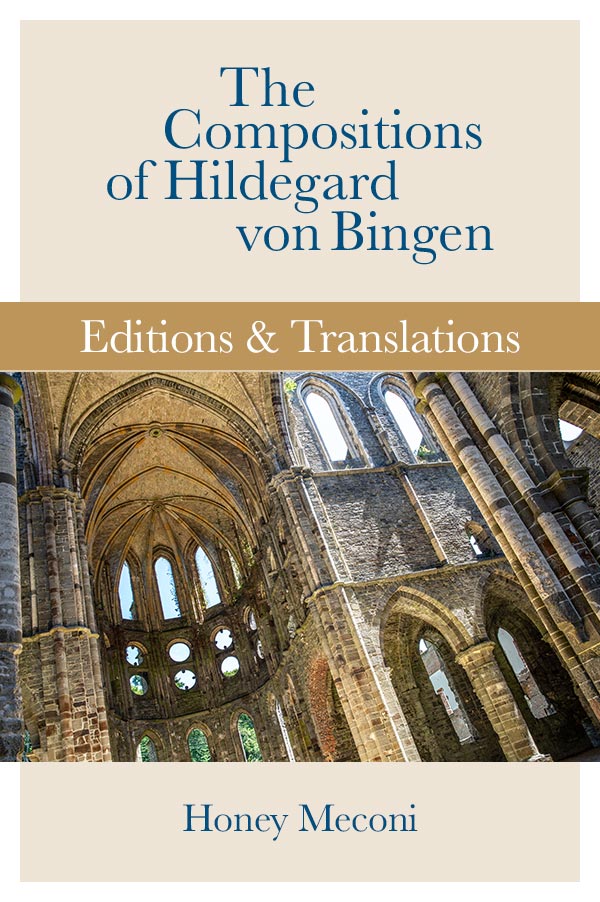Hildegard of Bingen
The Compositions of Hildegard von Bingen
 For several decades now people have been urging me to publish editions of Hildegard von Bingen (1098–1179), whose music I first performed in 1982. The material provided here begins to answer that request. Transcribing twelfth-century Rhineland neumes into modern notation presents many difficulties; for a discussion of problems with editions since the nineteenth century, see Honey Meconi, “The Unknown Hildegard: Editing, Performance, and Reception (An Ordo virtutum in Five Acts),” in Music in Print and Beyond: Hildegard von Bingen to The Beatles, 258–305, edited by Craig A. Monson and Roberta Montemorra Marvin (Rochester: University of Rochester Press, 2013).
For several decades now people have been urging me to publish editions of Hildegard von Bingen (1098–1179), whose music I first performed in 1982. The material provided here begins to answer that request. Transcribing twelfth-century Rhineland neumes into modern notation presents many difficulties; for a discussion of problems with editions since the nineteenth century, see Honey Meconi, “The Unknown Hildegard: Editing, Performance, and Reception (An Ordo virtutum in Five Acts),” in Music in Print and Beyond: Hildegard von Bingen to The Beatles, 258–305, edited by Craig A. Monson and Roberta Montemorra Marvin (Rochester: University of Rochester Press, 2013).
Each piece given here includes a transcription into stemless noteheads as well as a translation; comments on various issues are appended. “Editing and Translation Practices” outlines the multiple ways that these editions are unique and provides more detail on the choices made.
- Editing and Translation Practices (PDF)
- Aer enim volat
- Dendermonde version (PDF)
- Riesencodex version (PDF)
- Columba aspexit (PDF)
- Cum erubuerint
- Dendermonde version (PDF)
- Riesencodex version (PDF)
- De patria etiam earum
- Dendermonde version (PDF)
- Riesencodex version (PDF)
- Deus enim in prima
- Dendermonde version (PDF)
- Riesencodex version (PDF)
- Deus enim rorem
- Dendermonde version (PDF)
- Riesencodex version (PDF)
- Et ideo puelle
- Hodie aperuit/Nunc aperuit
- Karitas habundat
- Dendermonde version (PDF)
- Riesencodex version (PDF)
- Laus trinitati (PDF)
- Mathias sanctus
- O beata infantia (PDF)
- O Bonifaci
- Original version (PDF)
- Transposed up a fourth (PDF)
- O choruscans
- Original version (PDF)
- Transposed up an octave (PDF)
- Transposed up a fourth (PDF)
- O cruor sanguinis (PDF)
- O Euchari columba (PDF)
- O Euchari in leta via (PDF)
- O felix anima (PDF)
- O frondens virga (PDF)
- O orzchis ecclesia (PDF)
- O pastor animarum (PDF)
- O quam mirabilis (PDF)
- O quam preciosa
- Basic version (PDF)
- Alternative version (PDF)
- O rubor sanguinis
- Dendermonde version (PDF)
- Riesencodex version (PDF)
- O tu illustrata
- Original version (PDF)
- Edited version (PDF)
- O viridissima virga (PDF)
- O virtus sapientie (PDF)
- O vis eternitatis (PDF)
- Quia ergo femina
- Dendermonde version (PDF)
- Riesencodex version (PDF)
- Quia felix puericia (PDF)
- Sed diabolus
- Dendermonde version (PDF)
- Riesencodex version (PDF)
- Spiritus Sanctus
- Studium divinitatis
- Dendermonde version (PDF)
- Riesencodex version (PDF)
- Unde quocumque
Copyright: 2022–2026 Honey Meconi. Right to use: For noncommercial purposes, all editions and translations are freely available for use with proper acknowledgement to Honey Meconi as editor and translator.